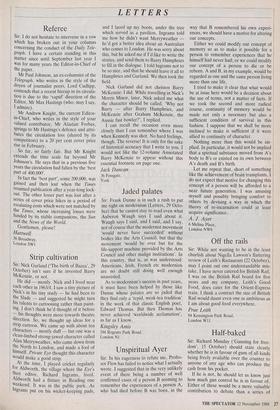Unspiritual Ayer
Sir: In his eagerness to refute me, Profes- sor Flew has failed to notice what I actually wrote. I suggested that in the very unlikely event of there being a number of well confirmed cases of a person B seeming to remember the experiences of a person A, who had died before B was born, in the way that B remembered his own experi- ences, we should have a motive for altering our concepts.
Either we could modify our concept of memory so as to make it possible for a person to remember experiences that he himself had never had; or we could modify our concept of a person to die or be reborn. A and B, in my example, would be regarded as one and the same person living more than one life.
I tried to make it clear that what would be at issue here would be a decision about the use of terms, not a matter of facts. If we took the second and more radical course, continuity of memory would be made not only a necessary but also a sufficient condition of survival in this fashion. I suppose that we shall be more inclined to make is sufficient if it were allied to continuity of character.
Nothing more than this would be im- plied. In particular, it would not be implied that a spiritual substance moved from A's body to B's or existed on its own between A's death and B's birth.
Let me repeat that, short of something like the achievement of brain transplants, I do not expect that motive for changing this concept of a person will be afforded to a near future generation. I was amusing myself and possibly bringing comfort to others by devising a way in which the theory of re-incarnation could at least acquire significance.
A. J. Ayer
6 Melina Place, London NW8










































































 Previous page
Previous page